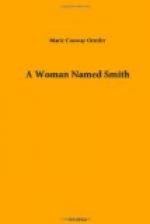I heard that opinion with mingled emotions.
“But we like Mr. Jelnik,” I said at last. “The injunction against him doesn’t hold water. Personally, I feel like apologizing to him.”
“Oh, no! One can’t afford to cuddle an old vendetta, as Abishag dry-nursed old King David. I always hated Abishag!” Alicia said naively.
“My late client,” said the judge enigmatically, “hadn’t counted on you.” He almost succeeded in looking human when he said it, and his eyes upon Alicia weren’t at all frosty. Then he folded his papers, replaced them in his wallet, wiped his glasses, shot his cuffs, hoped we’d find Hynds House all we’d hoped, hoped the town would be to our liking, hoped he could be of further service to us, bowed creakily, and took his departure.
“Sophy,” said Alicia, after a long pause, “if ever I had to rechristen this house, I’d call it Hornets’ Nest.”
* * * * *
We had not attended church on our first Sunday, because we were too tired. But on our second Sunday we plucked up heart of grace and went to St. Polycarp’s.
The old town wore an air of Sabbath peace and quietness infinitely soothing to the spirit. People passed and repassed us. We knew they knew who we were. The old gentlemen, indeed, bowed to us with stately uncoverings of the head; the rest regarded us with the sort of impersonal and perfunctory interest one bestows upon uninteresting passing strangers. Nobody spoke to us, though the eyes of the young men were not unaware of Alicia’s fairness.
In a great city, of course, one takes that sort of thing for granted; but in this small town, where everybody knew and spoke to everybody else, the effect was chilling.
“Talk about the sunny South!” murmured Alicia. “Why, my teeth want to chatter!”
During the services I was conscious of covert glances in our direction, but whenever a pair of feminine eyes met mine, they slid off like lizards and glided another way, with calculated Christian indifference. They weren’t hostile, nor unfriendly: they were just deliberately indifferent. Nobody had the faintest notion of being heedful of us strangers among them; and I should be sorry for angels who expected to be entertained unawares in South Carolina!
When the congregation had filed out and gone about its leisurely business, the minister and his wife came forward to greet us. They were a bit nervous, remembering the diabolic uproar about Faith, Hope, and Charity. Mr. Haile was a mild-mannered little man of the saved-sheep type, with box-plaited teeth and a bleating voice. His wife had the worried face and the anxious eyes of the minister’s helpmeet, and the painfully ready smile for newcomers who might, or might not, prove desirable parishioners.
She wanted to be nice to us as a Christian woman to women, but not too nice as the minister’s wife of a church whose members looked upon us as interlopers. I had deputed Judge Gatchell to inform the trustees that the suit was dropped. I suppose Mrs. Haile was timid about broaching the delicate subject, for she ignored it with a nervous intensity that made me feel sorry for her. She and Mr. Haile would call just as soon as it was convenient for us to receive visitors; and then they shook hands with us, and I think they breathed a sigh of relief.




